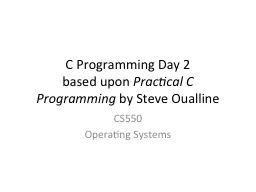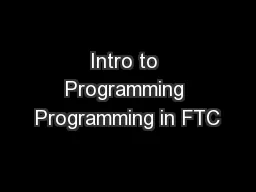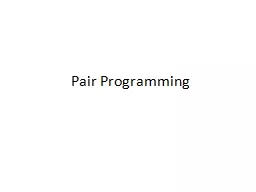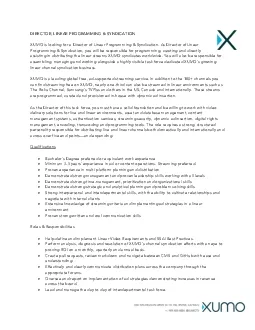PPT-C Programming Day 2
Author : test | Published Date : 2015-09-30
based upon Practical C Programming by Steve Oualline CS550 Operating Systems Variable Names Variable names must start with a letter or an underscore No special
Presentation Embed Code
Download Presentation
Download Presentation The PPT/PDF document "C Programming Day 2" is the property of its rightful owner. Permission is granted to download and print the materials on this website for personal, non-commercial use only, and to display it on your personal computer provided you do not modify the materials and that you retain all copyright notices contained in the materials. By downloading content from our website, you accept the terms of this agreement.
C Programming Day 2: Transcript
Download Rules Of Document
"C Programming Day 2"The content belongs to its owner. You may download and print it for personal use, without modification, and keep all copyright notices. By downloading, you agree to these terms.
Related Documents





![[PDF]-Programming 31: Python Programming In A Day & Excel Shortcuts (Python Programming,](https://thumbs.docslides.com/979804/pdf-programming-31-python-programming-in-a-day-excel-shortcuts-python-programming-python-language-python-for-beginners-excel-programming-languages-excel-programming.jpg)
![[eBOOK]-Programming 60: C++ Programming Professional Made Easy & MYSQL Programming Professional](https://thumbs.docslides.com/980127/ebook-programming-60-c-programming-professional-made-easy-mysql-programming-professional-made-easy-c-programming-c-language-c-for-beginners-c-mysql-programming-mysql-c-programming.jpg)
![[FREE]-Programming 58: C++ Programming Professional Made Easy & Windows 8 Tips for Beginners](https://thumbs.docslides.com/980128/free-programming-58-c-programming-professional-made-easy-windows-8-tips-for-beginners-c-programming-c-language-c-for-beginners-c-programming-programming-windows-8-c-programming.jpg)
![[eBOOK]-Programming 20:C Programming Professional Made Easy & Facebook Social Power (Facebook,](https://thumbs.docslides.com/980130/ebook-programming-20-c-programming-professional-made-easy-facebook-social-power-facebook-facebook-marketing-social-media-c-programming-c-programming-languages-android-c-programming.jpg)
![[eBOOK]-Programming 19:C Programming Professional Made Easy & Excel Shortcuts (Excel Programming,](https://thumbs.docslides.com/980131/ebook-programming-19-c-programming-professional-made-easy-excel-shortcuts-excel-programming-microsoft-excel-python-for-beginners-c-programming-c-programming-languages-android-c-programming.jpg)
![[FREE]-Programming 16: Python Programming In A Day & C Programming Professional Made Easy](https://thumbs.docslides.com/980148/free-programming-16-python-programming-in-a-day-c-programming-professional-made-easy-c-programming-c-programming-c-programming-language-html-python-python-programming-coding-css-java-php.jpg)
![[READ]-Programming 5:C Programming Success in a Day Excel Shortcuts (C Programming, C++programming,](https://thumbs.docslides.com/988966/read-programming-5-c-programming-success-in-a-day-excel-shortcuts-c-programming-c-programming-c-programming-language-excel-javascript-programming-microsoft-excel-python-java-php.jpg)